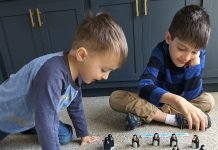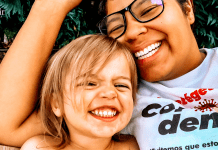I vote whenever the opportunity presents itself. I try to get to know the people and initiatives on my ballot as best I can. I talk about upcoming elections with friends and family regularly. I share my excitement with my kids. Voting is my jam.
While I know there are a lot of people like me, I know there aren’t. I also want to admit right now that outside of the last three years, I fell into the “even-year elections, only mildly informed” segment of the population. Until 2016, I couldn’t have named my state-level representative and senator; until 2018, I couldn’t have named my county commissioner or city council representation.
It’s never too late to turn up the dial on being a more enthusiastic and knowledgable voter — I didn’t make the shift until I was 34 years old.
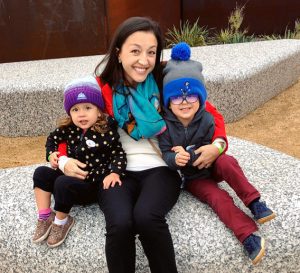
As a mother of children who are increasingly more aware of the world around them, I want to model civic engagement and informed voting. I want them to see my participation as a foundation for their own. I want to plant seeds and continue to water them. But before I can water my children’s growing curiosity, I must first tend to my own.
In recent years, my biggest focus has been helping my network of friends and family become more engaged or, at the very least, more confident voters because, after all, informed voting is responsible voting. My contribution this year is helping to inform you in hopes that you’ll feel more confident when casting your ballot and feel compelled to share information with those in your network.
Sample Ballots and General Voting Information
Knowing what’s on your ballot is the first step toward becoming a more informed voter.
When I’ve voted in person, I’ve always had my ballot pulled up on my phone as sort of a “cheat sheet.” My husband (who happens to be an AP American Government teacher) will often write down his votes and bring that sheet in with him to the voting booth because he wants to be sure he casts his votes according to his previous research.
Voting isn’t a test. Having information with you at the time of voting isn’t cheating — it’s actually quite the opposite.
When viewing my sample ballot, I tend to learn about something I get to vote on that I may not have known about. In Johnson County, for example, there is a ballot initiative about allowing establishments to sell alcoholic drinks without also having to sell food (right now, there is a 30% food requirement, which can be hard for smaller operations to meet). This November, JoCo voters will decide whether or not to end this practice. A “yes” vote will remove the food requirement; a “no” vote maintains the current parameters.
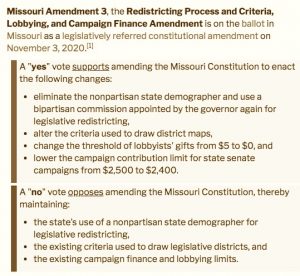
I also recently learned that there are two Constitutional Amendments on the Missouri ballot. While Amendment No. 1 is pretty straightforward (it’s about expanding term limits), Amendment No. 3 is a bit more complicated. I found this breakdown from ballotpedia.org that helped me make sense of it; basically, it’s a measure that will influence how the state is redistricted. It’s important to note that a similar amendment was approved by Missouri voters in 2018 with 62% of the vote. Essentially, a “yes” vote will nullify the 2018 decision made by Missouri voters to use a nonpartisan demographer to draw state legislative districts; a “no” vote will uphold 2018 redistricting policy.
Ballot measures can be written in less than intuitive ways, so being familiar with them in advance will allow you to vote on them with confidence.
For sample ballots as well as advance/mail voting information (including ballot drop box locations), and all other election details, please visit your county’s election office website.
Kansas
Douglas County
Franklin County
Johnson County
Leavenworth County
Miami County
Wyandotte County
Missouri
Cass County
Clay County
Jackson County
Kansas City, MO (residents within city limits)
Platte County
Resources for Informed Voting
The most intimidating part of the election process for many voters is getting informed.
I recommend visiting Vote411.org, which is a site helpful for all U.S. elections run by the League of Women Voters. While some candidates have not returned their surveys to the LWV, you can get to know those who did. Candidate websites and Facebook pages can be helpful as well; however, I appreciate being able to more directly compare the people running to represent me based on set questions, which is why I use Vote411.
For the incumbents on your ballot, you can look at their voting history to see how they align with your values and priorities.
On ballotpedia.org, you can look up your sample ballot and then click on individual candidates to get detailed information about their background, platform, and (if available) past record.
A lot of people tend to struggle with how to vote about judges. Fortunately, KCUR had a story recently about this very issue with lots of helpful links and info, “How To Make An Informed Decision When Voting For Judges In Missouri And Kansas.”
Side note: I know many voters rely on party designation when making their selections. Certain races, however, are nonpartisan, so all voters will see are candidate names. Although I encourage voters to be informed on all races, it’s especially important to familiarize yourself with candidates running in races where all that will be listed is their name. Yet another reason why previewing your sample ballot is important.
Options for Voting
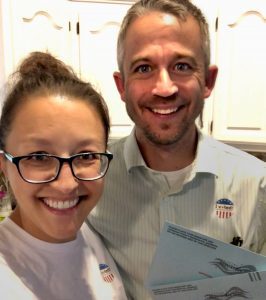
This year, I will be voting via mail ballot and then delivering that to a drop box; my husband will, too. We’re expecting a baby who is set to arrive via c-section the week of the election and find this to be the lowest stress option for us. Most years, I prefer voting early in person. My husband, however, enjoys the ceremony of voting on Election Day. How you vote this year will depend on where you live, how comfortable you feel with the precautions being taken for COVID-19, and what options are available to you.
Regardless of how you decide to vote, the sooner you make a voting plan, the better. And, given the high voter turnout expected this year, looking into options that allow you to vote prior to Election Day seems wisest to me.
To find out your voting options, it is best to visit your county’s election office website. The options vary quite a bit. In KCMO, people have been able to vote early in person since the end of September down at Union Station; however, from October 13th until October 30th, there will be five total locations available. In Johnson County, early in person voting begins on October 17th; click here for location and hours information as well as for ballot drop box locations.
The deadlines for advance/mail/absentee (virtually all the same thing) ballot requests are October 21st in Missouri and October 27th in Kansas; however, it is highly recommended that you request your ballot as early as possible. Note: In Missouri, those who request a ballot must have that ballot (not the application) notarized for it count; the application itself does not require a notary.
However or whenever you choose to vote this year, please do so and equip yourself to be as informed as possible.
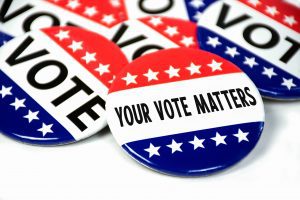 I don’t know who needs to hear this, but sitting out of an election because you’re disillusioned by the top of the ballot (President) allows down-ballot races to be much closer than they should be. While I don’t encourage voters to leave races blank, do what you need to do in order to show up for congress, your state legislature, your county, and your city.
I don’t know who needs to hear this, but sitting out of an election because you’re disillusioned by the top of the ballot (President) allows down-ballot races to be much closer than they should be. While I don’t encourage voters to leave races blank, do what you need to do in order to show up for congress, your state legislature, your county, and your city.
What other resources do you use to prepare yourself to vote? What remaining questions do you have about voting this year? Please comment so we can all help each other fully participate in our democracy this fall!








